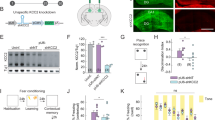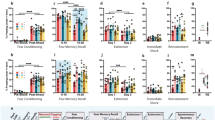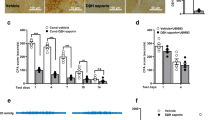Abstract
After acquisition, hippocampus-dependent memories undergo a systems consolidation process, during which they become independent of the hippocampus and dependent on the anterior cingulate cortex (ACC) for memory expression. However, consolidated remote memories can become transiently hippocampus-dependent again following memory reactivation. How this systems reconsolidation affects the role of the ACC in remote memory expression is not known. Using contextual fear conditioning, we show that the expression of 30-day-old remote memory can transiently be supported by either the ACC or the dorsal hippocampus following memory reactivation, and that the ACC specifically mediates expression of remote generalized contextual fear memory. We found that suppression of neural activity in the ACC with the AMPA/kainate receptor antagonist 6-cyano-7-nitroquinoxaline-2,3-dione (CNQX) impaired the expression of remote, but not recent, contextual fear memory. Fear expression was not affected by this treatment if preceded by memory reactivation 6 h earlier, nor was it affected by suppression of neural activity in the dorsal hippocampus with the GABA-receptor agonist muscimol. However, simultaneous targeting of both the ACC and the dorsal hippocampus 6 h after memory reactivation disrupted contextual fear memory expression. Second, we observed that expression of a 30-day-old generalized contextual fear memory in a novel context was not affected by memory reactivation 6 h earlier. However, intra-ACC CNQX infusion before testing impaired contextual fear expression in the novel context, but not the original training context. Together, these data suggest that although the dorsal hippocampus may be recruited during systems reconsolidation, the ACC remains necessary for the expression of generalized contextual fear memory.
Similar content being viewed by others
Log in or create a free account to read this content
Gain free access to this article, as well as selected content from this journal and more on nature.com
or
References
Anagnostaras SG, Maren S, Fanselow MS (1999). Temporally graded retrograde amnesia of contextual fear after hippocampal damage in rats: within-subjects examination. J Neurosci 19: 1106–1114.
Attwell PJ, Rahman S, Ivarsson M, Yeo CH (1999). Cerebellar cortical AMPA-kainate receptor blockade prevents performance of classically conditioned nictitating membrane responses. J Neurosci 19: RC45.
Bartlett FC (1932) Remembering: A Study in Experimental and Social Psychology. Cambridge University Press: Cambridge.
Biedenkapp JC, Rudy JW (2007). Context preexposure prevents forgetting of a contextual fear memory: implication for regional changes in brain activation patterns associated with recent and remote memory tests. Learn Mem 14: 200–203.
Corcoran KA, Desmond TJ, Frey KA, Maren S (2005). Hippocampal inactivation disrupts the acquisition and contextual encoding of fear extinction. J Neurosci 25: 8978–8987.
de Oliveira Alvares L, Einarsson EO, Santana F, Crestani AP, Haubrich J, Cassini LF et al (2012). Periodically reactivated context memory retains its precision and dependence on the hippocampus. Hippocampus 22: 1092–1095.
Debiec J, LeDoux JE, Nader K (2002). Cellular and systems reconsolidation in the hippocampus. Neuron 36: 527–538.
Einarsson EO, Nader K (2012). Involvement of the anterior cingulate cortex in formation, consolidation, and reconsolidation of recent and remote contextual fear memory. Learn Mem 19: 449–452.
Flavell CR, Barber DJ, Lee JL (2011). Behavioural memory reconsolidation of food and fear memories. Nat Commun 2: 504.
Frankland PW, Bontempi B (2005). The organization of recent and remote memories. Nat Rev Neurosci 6: 119–130.
Frankland PW, Bontempi B, Talton LE, Kaczmarek L, Silva AJ (2004). The involvement of the anterior cingulate cortex in remote contextual fear memory. Science 304: 881–883.
Goshen I, Brodsky M, Prakash R, Wallace J, Gradinaru V, Ramakrishnan C et al (2011). Dynamics of retrieval strategies for remote memories. Cell 147: 678–689.
Hardt O, Einarsson EO, Nader K (2010). A bridge over troubled water: reconsolidation as a link between cognitive and neuroscientific memory research traditions. Annu Rev Psychol 61: 141–167.
Hardt O, Nader K, Nadel L (2013). Decay happens: the role of active forgetting in memory. Trends Cogn Sci 17: 111–120.
Honore T, Davies SN, Drejer J, Fletcher EJ, Jacobsen P, Lodge D et al (1988). Quinoxalinediones: potent competitive non-NMDA glutamate receptor antagonists. Science 241: 701–703.
Kitamura T, Saitoh Y, Takashima N, Murayama A, Niibori Y, Ageta H et al (2009). Adult neurogenesis modulates the hippocampus-dependent period of associative fear memory. Cell 139: 814–827.
McClelland JL, McNaughton BL, O'Reilly RC (1995). Why there are complementary learning systems in the hippocampus and neocortex: insights from the successes and failures of connectionist models of learning and memory. Psychol Rev 102: 419–457.
Monfils MH, Cowansage KK, Klann E, LeDoux JE (2009). Extinction-reconsolidation boundaries: key to persistent attenuation of fear memories. Science 324: 951–955.
Nadel L, Moscovitch M (1997). Memory consolidation, retrograde amnesia and the hippocampal complex. Curr Opin Neurobiol 7: 217–227.
Nader K, Schafe GE, Le Doux JE (2000). Fear memories require protein synthesis in the amygdala for reconsolidation after retrieval. Nature 406: 722–726.
Riccio DC, Ackil J, Burch-Vernon A (1992). Forgetting of stimulus attributes: methodological implications for assessing associative phenomena. Psychol Bull 112: 433–445.
Rudy JW, Biedenkapp JC, O'Reilly RC (2005). Prefrontal cortex and the organization of recent and remote memories: an alternative view. Learn Mem 12: 445–446.
Ruediger S, Vittori C, Bednarek E, Genoud C, Strata P, Sacchetti B et al (2011). Learning-related feedforward inhibitory connectivity growth required for memory precision. Nature 473: 514–518.
Squire LR, Alvarez P (1995). Retrograde amnesia and memory consolidation: a neurobiological perspective. Curr Opin Neurobiol 5: 169–177.
Tse D, Langston RF, Kakeyama M, Bethus I, Spooner PA, Wood ER et al (2007). Schemas and memory consolidation. Science 316: 76–82.
Vetere G, Restivo L, Cole CJ, Ross PJ, Ammassari-Teule M, Josselyn SA et al (2011). Spine growth in the anterior cingulate cortex is necessary for the consolidation of contextual fear memory. Proc Natl Acad Sci USA 108: 8456–8460.
Wang SH, Tse D, Morris RG (2012). Anterior cingulate cortex in schema assimilation and expression. Learn Mem 19: 315–318.
Ward MT, Oler JA, Markus EJ (1999). Hippocampal dysfunction during aging I: deficits in memory consolidation. Neurobiol Aging 20: 363–372.
Wiltgen BJ, Silva AJ (2007). Memory for context becomes less specific with time. Learn Mem 14: 313–317.
Wiltgen BJ, Zhou M, Cai Y, Balaji J, Karlsson MG, Parivash SN et al (2010). The hippocampus plays a selective role in the retrieval of detailed contextual memories. Curr Biol 20: 1336–1344.
Winocur G, Frankland PW, Sekeres M, Fogel S, Moscovitch M (2009). Changes in context-specificity during memory reconsolidation: selective effects of hippocampal lesions. Learn Mem 16: 722–729.
Winocur G, Moscovitch M, Bontempi B (2010). Memory formation and long-term retention in humans and animals: convergence towards a transformation account of hippocampal-neocortical interactions. Neuropsychologia 48: 2339–2356.
Winocur G, Moscovitch M, Sekeres M (2007). Memory consolidation or transformation: context manipulation and hippocampal representations of memory. Nat Neurosci 10: 555–557.
Xu W, Sudhof TC (2013). A neural circuit for memory specificity and generalization. Science 339: 1290–1295.
Zhou YL, Riccio DC (1994). Pretest cuing can alleviate the forgetting of contextual stimulus attributes. Learn Motiv 25: 233–244.
Acknowledgements
We thank Oliver Hardt and Cyril Herry for helpful comments on the manuscript. This work was supported by grants from the Canadian Institutes of Health Research and the Natural Sciences and Engineering Research Council of Canada (to KN).
Author information
Authors and Affiliations
Corresponding authors
Additional information
Supplementary Information accompanies the paper on the Neuropsychopharmacology website
Rights and permissions
About this article
Cite this article
Einarsson, E., Pors, J. & Nader, K. Systems Reconsolidation Reveals a Selective Role for the Anterior Cingulate Cortex in Generalized Contextual Fear Memory Expression. Neuropsychopharmacol 40, 480–487 (2015). https://doi.org/10.1038/npp.2014.197
Received:
Revised:
Accepted:
Published:
Issue date:
DOI: https://doi.org/10.1038/npp.2014.197
This article is cited by
-
Systems consolidation induces multiple memory engrams for a flexible recall strategy in observational fear memory in male mice
Nature Communications (2023)
-
Repeated neonatal sevoflurane induced neurocognitive impairment through NF-κB-mediated pyroptosis
Journal of Neuroinflammation (2021)
-
Astrocytes contribute to remote memory formation by modulating hippocampal–cortical communication during learning
Nature Neuroscience (2020)
-
Chronic fluoxetine prevents fear memory generalization and enhances subsequent extinction by remodeling hippocampal dendritic spines and slowing down systems consolidation
Translational Psychiatry (2019)
-
Effects of naltrexone are influenced by childhood adversity during negative emotional processing in addiction recovery
Translational Psychiatry (2017)



